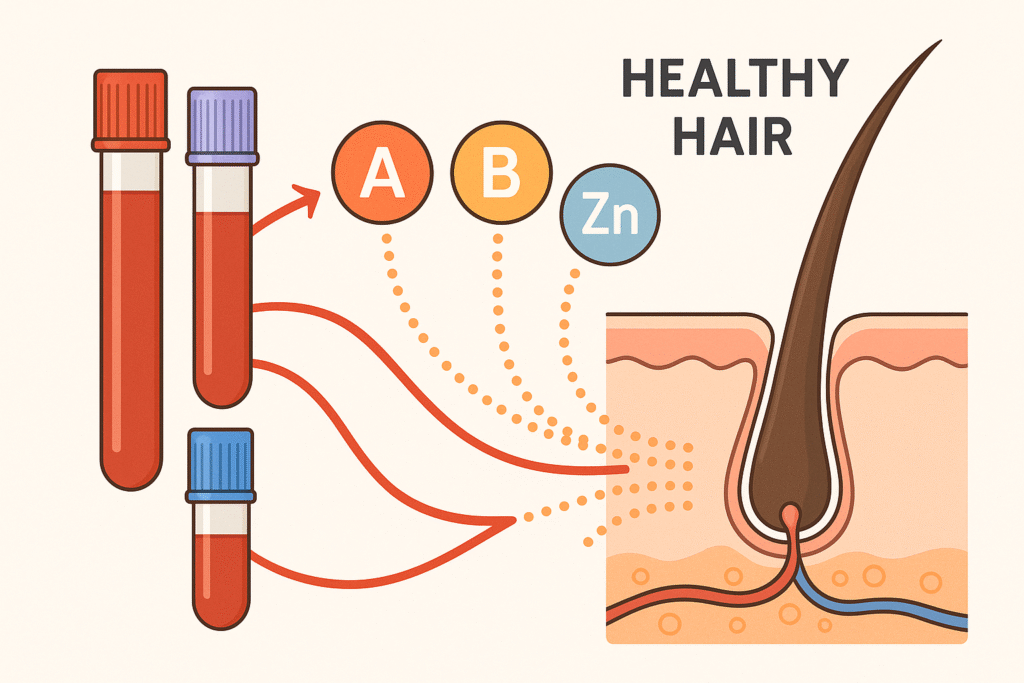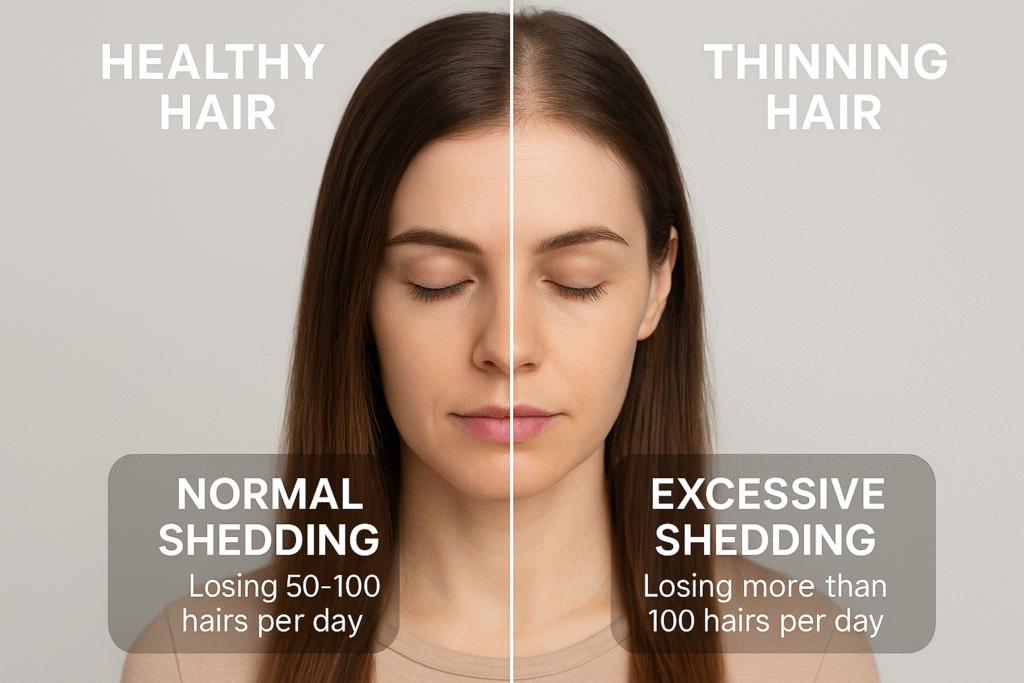Estimated reading time: 9 minutes
Introduction
The Vitamin A Hair Loss Paradox
We all know vitamins are essential for good health, and vitamin A is no exception. It plays a crucial role in vision, immune function, and even helps keep our skin glowing. But what if I told you that getting too much of this seemingly beneficial vitamin could lead to hair loss? Surprising, right? Yet, it’s a reality that many people are unaware of. In this article, we’ll delve into the fascinating connection between excessive vitamin A and hair loss, uncovering the science behind it and providing you with the knowledge you need to protect your precious locks.
Table of contents
- Introduction
- Understanding Vitamin A
- Vitamin A and the Hair Growth Cycle
- Sources of Vitamin A
- Symptoms of Vitamin A Toxicity
- How Much is Too Much?
- Reversing Vitamin A-Induced Hair Loss
- Prevention Tips
- Conclusion
- Scientific Studies & Review Articles
- Reputable Websites
- Medical Organisations & Expert Resources:
- Hair Loss GP Related Links
Understanding Vitamin A
Vitamin A isn’t a single substance; it’s actually a group of compounds. There are two main types:
- Retinoids: This is the active form of vitamin A found in animal products like liver, eggs, and dairy.
- Carotenoids: These are pigments found in plants like carrots, sweet potatoes, and spinach. Your body converts carotenoids into retinol.
Beyond its well-known role in vision, vitamin A is essential for:
- Cell Growth and Differentiation: It helps cells develop and function properly, including hair follicle cells.
- Immune Function: Vitamin A supports a healthy immune system, which is crucial for overall well-being.
- Skin Health: It plays a role in maintaining healthy skin, which is the foundation for healthy hair growth.
Vitamin A and the Hair Growth Cycle
To understand how vitamin A can affect hair, we need to look at the hair growth cycle:
- Anagen (Growth Phase): Hair actively grows during this phase, which can last several years.
- Catagen (Transition Phase): Hair growth stops, and the follicle shrinks.
- Telogen (Resting Phase): The old hair sheds, and a new hair begins to grow.
Vitamin A is essential during the anagen phase, helping hair follicles grow and produce healthy hair. However, excessive vitamin A can speed up this cycle, prematurely pushing hair into the telogen phase and causing it to shed faster than it can be replaced. This leads to the thinning hair and hair loss associated with vitamin A toxicity.
Several studies have linked high vitamin A intake to hair loss:
- A study published in the Journal of the American Academy of Dermatology found that individuals taking high doses of vitamin A supplements experienced increased hair shedding.
- Research in Dermatology and Therapy suggests that excessive vitamin A may disrupt the normal balance of growth factors in the scalp, hindering hair growth
Sources of Vitamin A
You can get vitamin A from both food and supplements:
- Food Sources: The richest sources include organ meats (liver), fish liver oils, eggs, dairy products, and fortified cereals. Orange and yellow fruits and vegetables like carrots, sweet potatoes, and mangoes are also good sources of carotenoids, which your body converts to vitamin A.
- Supplements: Vitamin A supplements are available in various forms, including retinol, retinyl palmitate, and retinyl acetate. It’s crucial to follow recommended dosages and avoid exceeding the safe upper limit.
Medications: Certain medications, such as Accutane (isotretinoin) used to treat acne, contain high doses of vitamin A and can cause hair loss as a side effect.
Symptoms of Vitamin A Toxicity
Excessive vitamin A intake doesn’t just affect your hair. It can wreak havoc on your entire body. Here are some of the common symptoms you might experience:
- Hair Loss: This is often the most noticeable and distressing symptom. You might notice increased shedding, thinning hair, or even patches of baldness.
- Dry Skin: Vitamin A is essential for skin health, but too much can lead to dryness, scaling, and itching.
- Headaches and Dizziness: These can occur due to increased pressure in the skull caused by vitamin A toxicity.
- Nausea, Vomiting, and Loss of Appetite: These are common signs of vitamin A overdose, especially if you’ve consumed a large amount of retinoids in a short period.
- Bone and Joint Pain: Chronic vitamin A toxicity can weaken bones and cause pain in the joints.
- Vision Changes: Blurred vision or double vision can be a sign of vitamin A toxicity affecting the eyes.
- Fatigue and Irritability: Feeling tired and irritable can be a result of the body’s struggle to process excess vitamin A.
If you experience any of these symptoms and suspect you might be consuming too much vitamin A, it’s crucial to consult a doctor immediately. Early diagnosis and treatment can prevent long-term complications and help reverse the effects of vitamin A toxicity.
How Much is Too Much?
Vitamin A is measured in micrograms of retinol activity equivalents (RAE). The recommended daily intake (RDA) varies depending on age and gender:
- Adult Men: 900 mcg RAE
- Adult Women: 700 mcg RAE
However, there’s also a tolerable upper intake level (UL) – the maximum daily amount you can safely consume without risking adverse effects. For adults, the UL is 3,000 mcg RAE. Exceeding this limit, especially for an extended period, can lead to vitamin A toxicity and its associated problems, including hair loss.
It’s important to note that individual sensitivity to vitamin A varies. Some people might experience symptoms at lower doses than others. If you’re concerned about your vitamin A intake, consult your doctor or a registered dietitian. They can help you determine the appropriate amount for your individual needs and monitor your levels through blood tests.
Reversing Vitamin A-Induced Hair Loss
The good news is that hair loss caused by excessive vitamin A is often reversible. Once you stop exceeding the recommended intake, your body will gradually eliminate the excess vitamin A, and your hair growth cycle should normalise. Here are some steps you can take:
- Stop Excess Intake: If you’re taking vitamin A supplements, discontinue them immediately. If you’re consuming a lot of vitamin A-rich foods, reduce your intake.
- Dietary Changes: Focus on a balanced diet with a variety of fruits, vegetables, and whole grains. Avoid or limit foods high in vitamin A like liver, fish liver oil, and fortified cereals.
- Consult a Doctor: Talk to your doctor about monitoring your vitamin A levels and getting personalised advice on dietary changes and any necessary treatment.
In most cases, hair growth will resume within a few months of reducing your vitamin A intake. However, it may take longer for severe cases of vitamin A toxicity.
Prevention Tips
Here are some tips to help you prevent vitamin A-induced hair loss:
- Eat a Balanced Diet: Focus on a variety of foods from all food groups, including plenty of fruits and vegetables.This will ensure you get all the nutrients you need for healthy hair without overdoing it on any one vitamin.
- Be Mindful of Supplements: Take vitamin A supplements only under the guidance of a healthcare professional and never exceed the recommended dosage.
- Read Labels: Check the vitamin A content of fortified foods and drinks. Some breakfast cereals, energy bars, and dairy products may contain high amounts of vitamin A.
- Get Regular Checkups: If you’re taking vitamin A supplements or have concerns about your intake, talk to your doctor about getting regular blood tests to monitor your levels.
Conclusion
Don’t Let Vitamin A Sabotage Your Hair
While vitamin A is essential for healthy hair, too much of a good thing can have adverse consequences. By understanding the risks of excessive vitamin A intake and following the prevention tips outlined above, you can protect your hair and overall health. Remember, a balanced diet and moderation are key. If you suspect you’re experiencing hair loss due to vitamin A toxicity, don’t hesitate to seek professional help. With proper guidance and care, you can restore your hair’s health and regain your confidence.
Recommended Read
Vitamin A FAQ: Your Questions Answered
Yes, excessive vitamin A intake can disrupt the hair growth cycle and lead to increased shedding and thinning. This is known as vitamin A toxicity or hypervitaminosis A.
The tolerable upper intake level (UL) for adults is 3,000 mcg RAE per day. Exceeding this limit regularly can lead to hair loss and other health problems.
Apart from hair loss, symptoms include dry skin, headaches, nausea, fatigue, bone pain, and vision changes.
Liver, fish liver oils, eggs, dairy products, and fortified cereals are rich in vitamin A. Orange and yellow fruits and vegetables like carrots, sweet potatoes, and mangoes.
If you’re experiencing hair loss, it’s wise to consult a doctor before taking any vitamin A supplements. They can help determine if your hair loss is related to
Yes, in most cases, hair loss due to excessive vitamin A is reversible. Once you reduce your intake to safe levels, your hair growth cycle should normalise within a few months.
Maintain a balanced diet, be mindful of vitamin A supplement intake, read food labels for vitamin A content, and consult your doctor for regular checkups and blood tests to monitor your vitamin A levels.
Yes, some medications like Accutane (isotretinoin), used for acne treatment, contain high doses of vitamin A and can lead to hair loss as a side effect.
While rare, prolonged and severe vitamin A toxicity can potentially lead to permanent hair loss if it damages hair follicles extensively.
If you experience any symptoms of vitamin A toxicity or are concerned about your intake, consult a doctor immediately. They can diagnose the condition, advise on dietary changes, and recommend appropriate treatment.
External Sources
Scientific Studies & Review Articles
Title: The role of vitamins and minerals in hair loss: A review
- Authors: Almohanna, HM; Ahmed, AA; Tsatalis, JP; Tosti, A
- Journal: Dermatol Ther. 2019 Mar;32(2):e12787.
- URL: https://pubmed.ncbi.nlm.nih.gov/30681685/
- Key Finding: Reviews the role of various vitamins and minerals in hair health, including vitamin A, and discusses how imbalances can contribute to hair loss.
Title: Retinoids in dermatology
- Authors: Mukherjee, S; Date, A; Patravale, V; Korting, HC; Roeder, A; Weindl, G
- Journal: Indian J Dermatol. 2006 Oct-Dec;51(4):237-47
- URL: https://pubmed.ncbi.nlm.nih.gov/17971777/
Key Finding: Discusses the use of retinoids (a form of vitamin A) in dermatology, including their potential side effects, such as hair loss.
Title: Vitamin A and Hair Loss: A Clinical Observation
- Authors: Gerber, LE; Erdman, JW Jr; Badger, TM; Cantor, AH; Smith, SB
- Journal: J Am Acad Dermatol. 1984 Jan;10(1):27-31.
- URL: https://pubmed.ncbi.nlm.nih.gov/6690984/
- Key Finding: Reports cases of hair loss in individuals taking high doses of vitamin A, suggesting a possible link between excessive intake and hair shedding.
Reputable Websites
- National Institutes of Health (NIH): Office of Dietary Supplements – Vitamin A Fact Sheet for Health Professionals: https://ods.od.nih.gov/factsheets/VitaminA-HealthProfessional/
- National Institutes of Health (NIH): MedlinePlus – Vitamin A: https://medlineplus.gov/ency/article/002400.htm
- Mayo Clinic: Hair Loss: https://www.mayoclinic.org/diseases-conditions/hair-loss/symptoms-causes/syc-20372926









